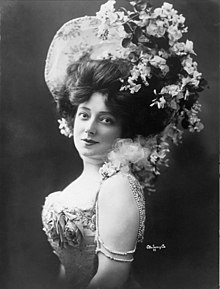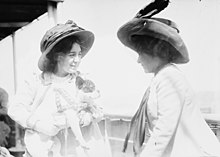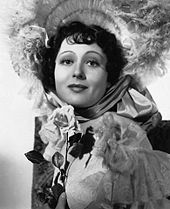| Anna Held | |
|---|---|
 | |
| Born | Helene Anna Held (1872-03-19)19 March 1872 Warsaw, Congress Poland |
| Died | 12 August 1918(1918-08-12) (aged 46) New York City, U.S. |
| Resting place | Gate of Heaven Cemetery |
| Occupations |
|
| Spouse |
Maximo Carrera
(m. 1894; div. 1908) |
| Partner | Florenz Ziegfeld (1897–1913) |
| Children | 1 |
Helene Anna Held (19 March 1872 – 12 August 1918) was a Polish-born French stage performer of Jewish origin on Broadway. While appearing in London, she was spotted by impresario Florenz Ziegfeld, who brought her to America as his common-law wife. From 1896 through 1910, she was one of Broadway's most celebrated leading ladies, presented in a succession of musicals as a charming, coquettish Parisian singer and comedienne, with an hourglass figure and an off-stage reputation for exotic behavior, such as bathing in 40 gallons of milk a day to maintain her complexion. Detractors implied that her fame owed more to Ziegfeld's promotional flair than to any intrinsic talent, but her audience allure was undeniable for over a decade, with several of her shows setting house attendance records for their time. Her uninhibited style also inspired the long-running series of popular revues, the Ziegfeld Follies.
Early life

Born in Warsaw, Held was named Helene Anna Held, daughter of a German Jewish glove maker, Shimmle (aka Maurice) Held, and his French-Jewish wife, Yvonne Pierre.
Sources list a variety of birth years, ranging from 1865 to 1873, but 1872 has been accepted in general. In 1881, anti-Semitic pogroms forced the family to flee to Paris. When her father's glove manufacturing business failed, he found work as a janitor, while her mother operated a kosher restaurant. Held began working in the garment industry, then found work as a singer in Jewish theatres in Paris and, later, after her father's death, London, where her roles included the title role in a production by Jacob Adler of Abraham Goldfaden's Shulamith; she was also in Goldfaden's ill-fated Paris troupe, whose cashier stole their money before they ever played publicly.
As a young woman in France, Held converted to Roman Catholicism.
Career
Early years


Her vivacious and animated personality proved popular and her career as a stage performer gained momentum as she became known for her risqué songs, flirtatious nature and willingness to show her legs on stage. In 1894, she married the much-older Uruguayan playboy Maximo Carrera, with whom she had a daughter, Lianne (1895–1988), who was also an actress and producer, sometimes billed as Anna Held Jr.
Touring through Europe, Held was appearing in London in 1896, when she met Florenz Ziegfeld, who asked her to return to New York City with him. He set about creating a wave of public interest in her, feeding stories to the American press, such as her having had ribs surgically removed. By the time Held and Ziegfeld arrived in New York, she was already the subject of intense public speculation. When she finally performed in a revival of A Parlor Match, the critics were dismissive, but the public approved.
Broadway success
 Held, in a publicity photo
Held, in a publicity photo Anna Held, by Aimé Dupont
Anna Held, by Aimé Dupont
David Monod of Wilfrid Laurier University has suggested that Held succeeded more on image than talent, the illusion she presented to post-Victorian era audiences who were beginning to explore new social freedoms. From 1896, Held enjoyed several successes on Broadway, including The Little Duchess (1901) and A Parisian Model (1906–1907). These, apart from bolstering Ziegfeld's fortune, made her a millionaire in her own right. Ziegfeld's talent for creating publicity stunts ensured that Held's name remained well known.
Held influenced the format for what would eventually become the famous Ziegfeld Follies in 1907, and she helped Ziegfeld establish the most lucrative phase of his career. Held could not perform in the first Follies when she become pregnant by Ziegfeld in late 1908. Held's daughter Lianne later claimed in her unpublished memoirs that Ziegfeld forced Held to have an abortion because he did not want her pregnancy interfering with Miss Innocence, a show in which she would star in 1908–09. The claim was repeated in an autobiography by Held entitled Anna Held and Flo Ziegfeld, however, Richard and Paulette Ziegfeld, (authors of The Ziegfeld Touch) concluded that Held never wrote her memoirs, and Lianne was the real author of the autobiography. Eve Golden, Held's biographer, wrote that Lianne's abortion claim was likely a lie designed to demonize Ziegfeld, whom Lianne loathed.
In 1909, Ziegfeld began an affair with the actress Lillian Lorraine; Held remained hopeful that his fascination would pass, and he would return to her, but instead he turned his attentions to another actress, Billie Burke, whom he married in 1914.
Film
New York entertainment entrepreneur Oliver Morosco cast Held in the lead for Madame la Presidente in 1916. According to an interview she gave to Hector Ames for Motion Picture Classic, she was paid $25,000 for her performance.
Later years and death
After Miss Innocence, Held left Broadway. She spent the years of World War I working in vaudeville and touring France, performing for French soldiers and raising money for the war effort. She was considered a war heroine for her contributions, and was highly regarded for the courage she displayed in traveling to the front lines, to be where she could do the most good.
 Held's grave in Gate of Heaven Cemetery
Held's grave in Gate of Heaven Cemetery Held's footstone
Held's footstone
The year 1917 was one of constant touring for Held; she toured the United States in a production of Follow Me until ill health caused her to close the show in January 1918. She then checked into the Hotel Savoy in New York City where her health continued to decline. Held had been battling multiple myeloma, a cancer of plasma cells, for a year. News coverage began reporting that it had been caused by her practice of excessive lacing of her corsets to give her a tiny waist.
According to the Washington Times, Held had been in and out of consciousness for about a week. On 12 August 1918, her doctor pronounced her dead, and the media was alerted. Approximately two hours later, Held revived, and the media notified she was still alive, only to have Held finally die shortly thereafter.
Held's funeral was held at St. Patrick's Cathedral in Manhattan on 14 August. Florenz Ziegfeld did not attend; he had a phobia about death and never attended funerals. Held is interred at Cemetery of the Gate of Heaven in Hawthorne, New York.
Legacy

- The MGM film The Great Ziegfeld (1936) tells a sanitized version of the Ziegfeld-Held relationship. Luise Rainer won an Academy Award for her performance as Held. Ziegfeld and Burke were played by William Powell and Myrna Loy.
- In 1978, Columbia Pictures released a made-for-television film on NBC, Ziegfeld: The Man and His Women. Held was portrayed by Barbara Parkins.
- The American poet Carl Sandburg wrote a memorial poem for Anna Held, An Electric Sign goes Dark, in the collection Smoke and Steel.
- In 1976, Held's daughter Lianne Carrera opened a museum of her mother's personal and stage items in San Jacinto, California.
Stage
| Year | Title | Role | Theatre | Produced by | Ref(s) |
|---|---|---|---|---|---|
| 1896 | A Parlor Match | — | Herald Square Theatre | Florenz Ziegfeld Jr. | |
| 1897 | The French Maid | Suzette | Herald Square Theatre | Florenz Ziegfeld Jr. and Charles E. Evans | |
| 1897 | La poupée | Alesia | Olympia Theatre | Oscar Hammerstein I | |
| 1899–1900 | Papa's Wife | Anna | Manhattan Theatre | Florenz Ziegfeld Jr. | |
| 1901–02 | The Little Duchess | The Little Duchess | Casino Theatre Grand Opera House |
Florenz Ziegfeld Jr. | |
| 1903–04 | Mam'selle Napoleon | Mademoiselle Mars | Knickerbocker Theatre | Florenz Ziegfeld Jr. | |
| 1904–05 | Higgledy-Piggledy | Mimi de Chartreuse | Weber's Music Hall | Florenz Ziegfeld Jr. and Joseph M. Weber | |
| 1907–08 | A Parisian Model | Anna | Broadway Theatre | Florenz Ziegfeld Jr. and Frank McKee | |
| 1908–09 | Miss Innocence | Anna, Miss Innocence | New York Theatre | Florenz Ziegfeld Jr. | |
| 1913–14 | Anna Held's All Star Variete Jubilee | Self | Casino Theatre | John Cort | |
| 1916–17 | Follow Me | Claire LaTour | Casino Theatre | Lee Shubert and Jacob J. Shubert |
Filmography
| Year | Title | Role | Notes |
|---|---|---|---|
| 1901 | Anna Held | Herself | Close-up version Short subject |
| 1901 | Anna Held | Herself | Full-length version Short subject |
| 1910 | The Comet | Short subject | |
| 1913 | Elevating an Elephant | Herself | Short subject |
| 1913 | Popular Players Off the Stage | Herself | Short subject |
| 1916 | Madame la Presidente | Mademoiselle Gobette |
References
- Fields, Armond (2006). Women Vaudeville Stars: Eighty Biographical Profiles. McFarland. p. 22. ISBN 978-0-786-42583-9.
- ^ Pollak, Oliver B. "Anna Held". Jewish Women's Archive. Retrieved 14 January 2018.
- James, Edward T.; Wilson James, Janet; Boyer, Paul S., eds. (1971). Notable American Women, 1607–1950: A Biographical Dictionary, Volume 1. Vol. 1. Harvard University Press. p. 178. ISBN 978-0-674-62734-5.
- "Anna Held & John Drew- Sandburg's Hometown – by Barbara Schock – 22 June 2015". Sandburg.org. Retrieved 15 January 2018.
- "Anna Held's Daughter, Done With Stages, Lives Life Of Farmer and Innkeeper". The Pittsburgh Press. 10 September 1933. p. 6. Retrieved 11 October 2014.
- Lankevich, George J. (2001). Postcards from Times Square. Square One Publishers, Inc. ISBN 978-0-7570-0100-0.
- Cullen, Frank; Hackman, Florence; McNeilly, Donald (2004). Vaudeville Old & New: An Encyclopedia Of Variety Performances In America, Volume 1. Psychology Press. p. 501. ISBN 978-0-415-93853-2.
- "Can She Sing, Too?". New-York Tribune. 20 September 1896. pp. 4, col. 3. Retrieved 14 January 2018.
- Monod, David (2011). "The Eyes of Anna Held: Sex and Sight in the Progressive Era". The Journal of the Gilded Age and Progressive Era. 10 (3): 289–327. doi:10.1017/S1537781411000065. JSTOR 23045138. S2CID 162680202.
- ^ Golden, Eve (2013). Anna Held and the Birth of Ziegfeld's Broadway. University Press of Kentucky. pp. 121–22. ISBN 978-0-813-14653-9.
- ^ Hanson, Nils (2011). Lillian Lorraine: The Life and Times of a Ziegfeld Diva. McFarland. ISBN 978-0-786-48935-0.
- "Florenz Ziegfeld Dies in Hollywood After Long Illness". The New York Times. Archived from the original on 31 May 2016. Retrieved 16 September 2016.
- Ames, Hector (1916). "A "Close Up" of Anna Held". Motion Picture Classic. 2: 1–6 & 57–58. Retrieved 14 January 2018.
- "Madame la Presidente". IMDb. Archived from the original on 14 January 2018. Retrieved 12 January 2018.
- "Anna Held a Victim of "Tight Lacing?"". Richmond Times-Dspatch. 26 May 1918. p. Image 47. Retrieved 15 January 2018.
- "Science Explains Anna Held's Awakening From Two Hours of Death". The Washington Times. 1 September 1918. p. Image 19. Retrieved 1 January 2018.
- "Last Curtain For Anna Held". The Spokesman-Review. 16 August 1918. p. 8. Retrieved 11 October 2014.
- "Miss Held's Funeral". The Toronto World. 15 August 1918. p. 10. Retrieved 11 October 2014.
- Berardinelli, James. "Reelviews Movie Reviews". Reelviews Movie Reviews. Retrieved 14 January 2018.
- "Ziegfeld: The Man and His Women". The Star Press – via Newspapers.com (subscription required) . 21 May 1978. p. 26. Retrieved 14 January 2018.
- Schock, Barbara (22 June 2015). "Anna Held & John Drew- Sandburg's Hometown". Sandburg.org. Retrieved 14 January 2018.
- "A Parlor Match". The Broadway League. Retrieved 14 January 2018.
- "The French Maid". The Broadway League. Retrieved 14 January 2018.
- "La poupée". The Broadway League. Retrieved 14 January 2018.
- "Papa's Wife". The Broadway League. Retrieved 14 January 2018.
- "The Little Duchess". The Broadway League. Retrieved 14 January 2018.
- "Mam'selle Napoleon". The Broadway League. Retrieved 14 January 2018.
- "Higgledy-Piggledy". The Broadway League. Retrieved 14 January 2018.
- "A Parisian Model". The Broadway League. Retrieved 14 January 2018.
- "Miss Innocence". The Broadway League. Retrieved 14 January 2018.
- "Anna Held's All Star Variete Jubilee". The Broadway League. Retrieved 14 January 2018.
- "Follow Me". The Broadway League. Retrieved 14 January 2018.
- "Anna Held". AFI Catalog of Feature Films. American Film Institute. Archived from the original on 1 January 2017. Retrieved 31 December 2016.
- "Anna Held profile". AFI Catalog of Feature Films. American Film Institute. Archived from the original on 1 January 2017. Retrieved 31 December 2016.
- "The Comet". AFI Catalog of Feature Films. American Film Institute. Archived from the original on 1 January 2017. Retrieved 31 December 2016.
- "Madame La Presidente". AFI Catalog of Feature Films. American Film Institute. Archived from the original on 22 April 2016. Retrieved 31 December 2016.
Further reading
- Eve Golden, Anna Held and the Birth of Ziegfeld's Broadway, Lexington: University Press of Kentucky, 2000
External links
- Anna Held at the Internet Broadway Database

- Anna Held at IMDb
- New York Times article announcing Held's death
- Article about Held in Theatre Magazine
- Anna Held picture gallery
- Anna Held portraits (New York Public Library)
- Portrait gallery (University of Washington, Sayre collection)
- Anna's 1901 film; "Champagne"(Wayback Machine)
- Anna Held driving her Maxwell motorcar
| Ziegfeld Follies | |
|---|---|
| Shows | |
| Radio | |
| Films | |
| People | |
| Related articles | |
- 1872 births
- 1918 deaths
- 19th-century French actresses
- 20th-century French actresses
- Actresses from Paris
- Burials at Gate of Heaven Cemetery (Hawthorne, New York)
- Deaths from cancer in New York (state)
- Converts to Roman Catholicism from Judaism
- Deaths from multiple myeloma in the United States
- French emigrants to the United States
- 19th-century French women singers
- French film actresses
- French musical theatre actresses
- French Roman Catholics
- French silent film actresses
- French stage actresses
- Emigrants from the Russian Empire to France
- Jewish French actresses
- Jewish women singers
- 20th-century American women singers
- 20th-century American singers
- Vaudeville performers
- Ziegfeld girls